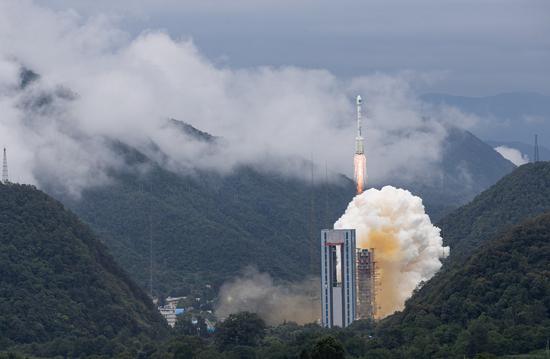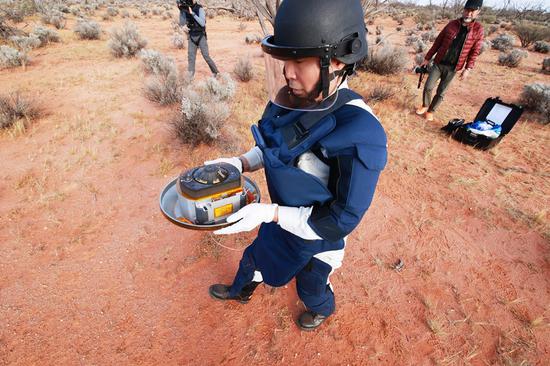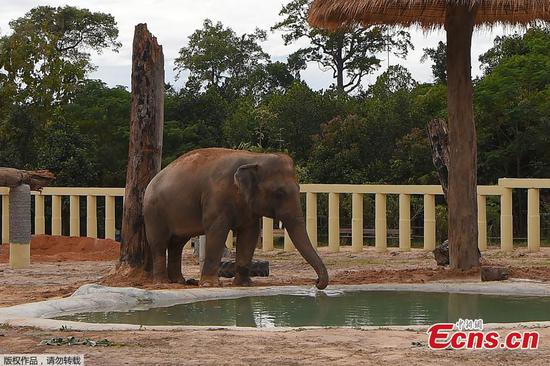
A carrier rocket carrying the last satellite of the BeiDou Navigation Satellite System (BDS) blasts off from the Xichang Satellite Launch Center in southwest China's Sichuan Province, June 23, 2020. (Xinhua/Jiang Hongjing)
China's BeiDou Navigation Satellite System (BDS) is creating new opportunities for the global aviation industry as it expands its international aerospace industry partnerships.
"China has been sharing BDS achievements with the world in an open and cooperative manner, coordinating and collaborating with other satellite navigation systems," said Ran Chengqi, director of the China Satellite Navigation Office.
China officially commissioned the BeiDou Navigation Satellite System on July 31, opening the new BDS-3 system to global users.
"China has been promoting the incorporation of BDS into the standards of international organizations in fields such as civil aviation, maritime affairs, search and rescue, and mobile communication," said Ran.
A total of 189 BDS-3 performance indicators passed technical verification at the just-concluded 6th plenary meeting of navigation system panel of the International Civil Aviation Organization, highlighting international recognition of BDS-3 services and laying a foundation for promoting its industrial applications.
Backed by the country's civil aviation authorities and the China Satellite Navigation Office, a joint team has spent 10 years drafting and verifying BDS standards for applications in the civil aviation sector.
The next step involves formulating standards for BDS applications in the global civil aviation sector and developing BDS-based air navigation equipment.
MASSIVE MARKET
"The ancient Chinese invented the compass, and the modern Chinese are giving the world BDS," said Wang Yongquan, chairman of Shanghai ComNav Technology Ltd.
BDS brings more choices for global users and integrates with other major satellite navigation systems, said Wang.
As a pioneer in the international satellite navigation market, ComNav Technology has extended its global network to more than 120 countries and regions, including about 40 along the Belt and Road.
The company's products have gained popularity due to its high-accuracy positioning capacities through integration with other navigation systems.
"Our products have been applied in UAV (unmanned aerial vehicles) and other domains. We will further explore the civil aviation demand for high-accuracy positioning," Wang said.
China has the world's second largest civil aviation market. By the end of October, the country's civil aircraft fleet totaled 6,408, including 3,771 transport aircraft and 2,637 general aircraft, according to the Civil Aviation Administration of China.
Strong growth is expected to continue despite near-term challenges. China's airlines are expected to acquire 8,600 new aircraft valued at 1.4 trillion U.S. dollars over the next 20 years, according to Boeing's 2020 annual China market forecast released in November.
GREAT POTENTIALS
BDS has been deeply integrating with emerging technologies and playing significant roles in the fight against COVID-19.
BDS-based UAVs and unmanned ground vehicles were used to deliver medical supplies to epidemic-stricken areas.
BDS is also used in some models of China's large-scale Wing Loong UAV family.
"UAV requires the aid of external systems to bring its role into full play and BDS provides essential support for it," said Li Yidong, chief designer of Wing Loong UAV series of AVIC (Chengdu) Unmanned Aircraft System Company.
BDS can also support emergency telemetry and tele-control with its distinctive short message communication function.
"All these have improved the capability and level of services provided by Wing Loong UAVs in important domains such as emergency rescue, meteorological services and maritime monitoring," Li said.
BDS has been installed on about 300 general aircraft, accounting for 11 percent of the total in China, said a report on the construction and development of BDS by the China Satellite Navigation Office.
BDS is one of four global navigation satellite systems, alongside the United States' GPS, the European Union's Galileo, and Russia's GLONASS.
China has been actively encouraging cooperation and exchanges between BDS and other navigation systems. BDS and GLONASS are compatible, and the BDS and GPS are compatible and interoperable.
"BDS will adhere to the principles of openness, cooperation and sharing. We will actively perform in international cooperation and promote the development of global satellite navigation," Ran said.


















































